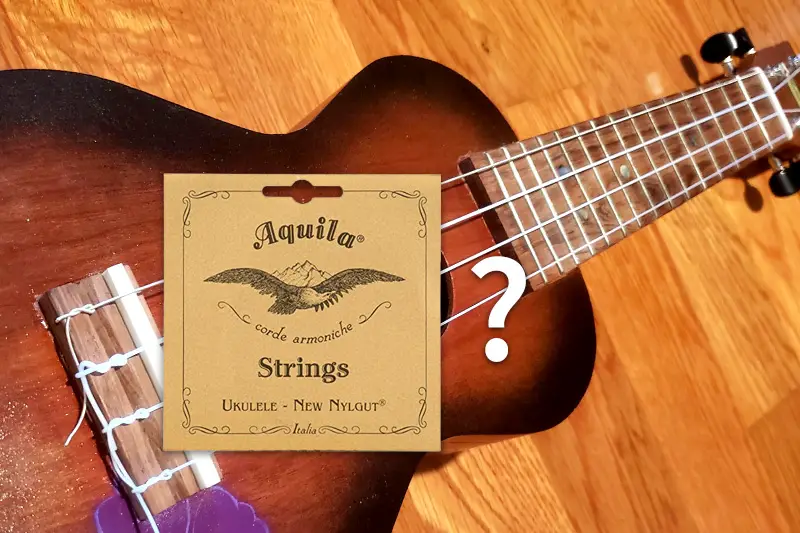Choosing the right strings for your ukulele is a deep subject with many layers, like ogres. Or parfaits. And the better you get at playing, the deeper and more complex the subject gets.
As a beginning ukulele player, you want strings that are going to be easy on your fingers, easy to play, and allow you to play and learn comfortably. For your first set of strings, you’ll want strings that are nylon (or similar material) and the smallest gauge. Avoid metal strings.
My favorite brand of ukulele strings is Aquila so that’s what I’ll recommend here.
Purchasing beginner ukulele strings is both an easier and a more difficult decision than purchasing strings for guitars. How can that be, you might ask? The same way an egg shell in an Egg McMuffin is, at the same time, disgusting and reassuring.
Considerations For Purchasing Ukulele Strings
The first thing to consider is, of course, what kind of ukulele you are purchasing strings for. There are several types of ukuleles in the ukulele family. From smallest to largest you have the pocket, soprano, concert, tenor, baritone, bass and the relatively new “Rumbler” or contrabass.
You most likely have a soprano, concert or tenor ukulele so those are the strings we will focus on here. When purchasing your ukulele strings make sure you know what type of ukulele you have so that you can purchase the appropriate type of strings.
How To Know What Type Of Ukulele You Have

If you are unsure if you have a soprano, concert, or tenor ukulele the best way to determine this is to measure the scale. Using a measuring tape, measure from the nut to the saddle. This is your ukulele’s scale. Ukulele scale is fairly universal, however there will be a slight variation of fractions of an inch between manufacturers. A soprano will have a scale of approximately 13 inches. The concert ukulele will have a scale in the very close neighborhood of 15 inches and tenor ukulele’s scale will fall in the ballpark of about 17 inches.
| Type of Ukulele | Length Nut to Saddle | Ukulele Strings |
|---|---|---|
| Soprano Ukulele | Around 13 inches | Use Soprano Ukulele Strings |
| Concert Ukulele | Around 15 inches | Use Concert Ukulele Strings |
| Tenor Ukulele | Around 17 inches | Use Tenor Ukulele Strings (Wound Low G) |
Ukulele String Material and Gauge
 Ukuleles can have either nylon strings (or similar material) or a combination of nylon and strings wound with metal. As a beginner you typically want to go with the lightest gauge strings as they are easiest to play and are the most gentle on your finger tips. Ukulele strings do not have the range of gauges you would find with guitar strings, however you can look at the package and see what size each string is and choose the one with the smallest set.
Ukuleles can have either nylon strings (or similar material) or a combination of nylon and strings wound with metal. As a beginner you typically want to go with the lightest gauge strings as they are easiest to play and are the most gentle on your finger tips. Ukulele strings do not have the range of gauges you would find with guitar strings, however you can look at the package and see what size each string is and choose the one with the smallest set.
Because ukulele strings are typically nylon or a similar material, string gauge does not have as much of an influence on tone or timber, which is why ukulele string gauges are more consistent across brands. The short scale and the use of nylon or similar material strings also make playing the ukulele much easier on your fingers.
Do You Want A High G or Low G?
The 2nd thing you need to know is if you want a low G or a high g for your 4th string. A low G string will have a larger gauge than a high g. The low G gives you more range for picking and soloing. As a beginner you will be focused on learning your form, chords, and strumming. For this reason I recommend starting out with a high g for the 4th string. It is easier to play and a bit kinder to your fingers.
As you grow as a ukulele player you can make a decision on changing to a low G string for your 4th string but there are a few caveats to this. If you have a soprano ukulele you should stick with a high g string. A soprano ukulele has such a small body and very little bass tone. A low G strings tone will essentially be lost on a soprano ukulele. If you have a concert ukulele, you’re in a transitional area. You can go either way. It really just depends on your preference. A concert ukulele has better bass range than a soprano ukulele but not as good as a tenor. And if you have a tenor ukulele I recommend a low G string. I’ll get into why in a bit.
After playing your ukulele for some time, you may find yourself trying to decide if you want to go with wound strings. A wound string is similar to a classical guitar string. It has a fine metal wire wound around the string. The most common wound string is the low G, but there are players who also like a wound C string as well. A set of ukulele strings with a wound C is hard to find and you are likely better off purchasing it as a single string.
What Are The Pros And Cons of a Wound Ukulele String?
I have found that a wound low G’s benefits far outweigh the negatives. A wound low G ukulele string expands the depth, warmth, and range of tone that your ukulele can produce while also allowing for more complex playing styles. For instance, the lowest note with a low G string is G3 compared to a C4 with a high g string. You don’t need a wound string to get that lower G note, however, in my opinion a wound low G string has a far superior tone to an unwound.
 Wound strings also have a shorter break in period. New unwound strings will require several days of retuning before they start to hold their pitch. This can be a pro or a con depending on your perspective. With one or two wound strings they settle in quicker while you are still trying to get your wound strings to hold pitch.
Wound strings also have a shorter break in period. New unwound strings will require several days of retuning before they start to hold their pitch. This can be a pro or a con depending on your perspective. With one or two wound strings they settle in quicker while you are still trying to get your wound strings to hold pitch.
The biggest negatives of wound ukulele strings may paint a picture of a string that is not worth the trouble, but most of the negatives can be overcome. I find wound ukulele strings to be less responsive. They are stiffer and harder on the fingers. They also require a more deft touch as they can squeak if you drag your fingers, just like on acoustic guitar strings. Also, they are a smaller gauge than an unwound low G which may require modifications to the ukulele’s nut. And lastly, they do not last as long as unwound strings and have to be replaced much more frequently.
Can I put guitar strings on a ukulele?
It is not a good idea to put guitar strings on most ukuleles. Some of the most common repairs I do on ukuleles are regluing necks and bridges that have come loose due to poor construction. Ukuleles are not built with the same structure and bracing of guitars and can not support the added tension of guitar strings. An acoustic guitar is under as much as 200lbs of tension whereas a soprano ukulele is dealing with about 1/10th the tension. Further, a remarkable number of ukuleles are barely more than souvenir toys and are very poorly built. Any kind of guitar strings (acoustic, classical or electric) will likely cause damage. If you add a little bit of heat to the mix, like a hot car or close proximity to a heat vent… fugetaboutit. Glue, heat, and tension do not mix.
High end, well-built ukuleles can handle the tension of classical guitar strings and it is not unheard of for luthiers to use them on their custom instruments. Unless the luthier themself says it is ok to put classical guitar strings on your ukulele I would steer clear as an abundance of caution.
What Ukulele Strings Are Best For You?
As with any stringed instrument, you have a plethora of choices when it comes to ukulele strings. We recommend the strings in the table above that fit your type of ukulele.
Ultimately, you have to decide for yourself what strings are going to best meet your needs. The best way to determine this is to try many different types of strings. You can always make a trip to your local music store to try playing several different ukuleles with different string arrangements. Or you can buy several brands and types and give them a good test run. Ukulele strings only run about $5 or $6 for a set so it’s not hugely expensive to experiment.
As you fall in love with playing your ukulele, make sure to take proper care of it. You’ll definitely want to check out our Best Ways To Care For Your Ukulele (A Complete Guide).


